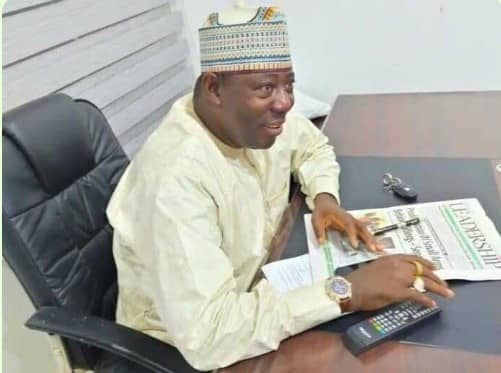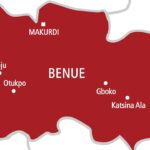By Gidado Ibrahim
Nigerians received with ecstasy the safe release of 137 school children abducted from Kuriga in Kaduna State. The safe rescue of the kids portends one thing, that gone are the days when criminal elements invade schools and abduct children at will while government and security agencies watch helplessly.
Another thing it portends for Nigeria is that security dynamics are changing. Needless to remind Nigerians that this feat couldn’t have been possible without our able gallant and re-energised security agencies who are on top of their game.
It was President Harry Truman of United States, who famously said “the buck stops here.” Hence, in presidential democracy, every blame and credit is borne by the President. The new vista in our security system can safely be attributed to the relentless sense of purpose of the President and Commander-in-Chief of the Armed Forces of Nigeria, Bola Ahmed Tinubu. He has for the umpteenth time demonstrated an unparalleled sense of national duties in handling his office.
For those who are familiar with the trajectory of his ascension of the office of Commander-in-Chief, Tinubu’s feats is not coming as a surprise at all. He had a clear roadmap and expressly laid out same in his Renewed Hope Manifesto. In any case it would have been a huge surprise if the president is not in charge because of his antecedents.
For the benefit of hindsight, Section 14(2) (b) of the Constitution of the Federal Republic of Nigeria 1999 declares that the security and welfare of the people shall be the primary purpose of government. In this declaration, the security and welfare of the people are conjunctively presented as a sole purpose. For Tinubu, this solemn assignment is not negotiable.
Equally, he demonstrated from on set that he is not in for excuses. That was why he went for an egg-head in the capacity, credibility, stature and character of Nuhu Ribadu as the National Security Adviser. Ribadu is a senior official in the cabinet of the presiden who manages national security on behalf of the president and serves as his chief advisor on all matters that are vital to the very survival of the state.
For the benefit of the uninitiated, Section 4 of the National Security Agencies Act, 1986, which disbanded the Nigerian Security Organisation and created three security agencies in its place- the Defence Intelligence Agency, the National Intelligence Agency and the State Security Service – specifically empowered the president, as the Commander-in-Chief of the Armed Forces, to appoint a Coordinator on National Security.
Section 4(2) of the Act states: The Coordinator on National Security shall be a Principal Staff Officer in the Office of the President, Commander-in- Chief of the Armed Forces.” And Section 4(3) defines the role of the coordinator on National Security to include: “Advising the President on matters concerning intelligence activities of the (created) agencies; Making recommendations in relation to the activities of the agencies to the President as contingencies may warrant; Correlating and evaluating intelligence reports relating to national securitv and providing the intelligence reports relating to national security and providing the appropriate dissemination of such intelligence within Government using existing facilities as the President may direct; Determining the number and level of staff to be employed by each agency established by the Act; and Doing such other things in connection with the forgoing provisions of this section as the President may determine.
Against the backdrop of the foregoing, Ribadu has, with the swift rescue of the Kuriga pupils, demonstrated that he possesses the capacity to effectively manage his office.
As ably stated by the Defence Headquarters (DHQ), the abducted students were rescued through coordinated search and rescue operation conducted by the military in collaboration with local authorities and government agencies which culminated in their rescue at the early hours of Sunday, March 7.
The story of improved security within less than a year under Tinubu and the supervision of NSA Ribadu does not just end in the rescue of the Kuriga schoolchildren. Another applause must go to our intelligence agencies for retrieving the 17 Almajiris abducted by bandits in Sokoto.
The NSA under Tinubu’s Renewed Hope administration has also performed wonders by making effective arrest and prosecutions of the perpetrators, saboteurs of our forex economy as ordered by the president. What remains important now is for the NSA to create political intelligence bureau (PIB) to gather intelligence on activities of political parties and crosscheck financial bureaucracies of state and local governments through the Directorate of intelligence. EFCC from 2015 to date has to go after sponsors of mayhem who are trying to rubbish the Renewed Hope Agenda.
Aside improving the security situation in our country, the Renewed Hope Government led by President Tinubu scored another decisive point on Monday, when the gloating of Renewed Hope Infrastructure Fund was announced. Don’t forget that experts have been projecting that Nigeria needs $25 billion annually until 2040 to cover its infrastructure expenditure.
The Renewed Hope Infrastructure Fund, passed by the Federal Executive Council (FEC) on Monday will be used to finance the Lagos-Kano and Eastern Rail Lines, along with other key infrastructure projects. This initiative is aimed at financing critical national projects that will accelerate infrastructure and economic development in all parts of the country, particularly in road, rail construction, agriculture, aviation, education, health, energy and technology.
Among the projects being targeted are major road networks such as the Lagos-Calabar Coastal highway, Sokoto-Badagry Expressway, Lagos-Kano and Eastern Rail Lines. Ports and aviation facilities will be mordenised. Additionally, the Fund will also focus on enhancing the nation’s agricultural value chain to boost food security, as well as help create employment opportunities and promote exports, among other things.
This necessitated the establishment of the Presidential Infrastructure Development Fund (PIDF) by former President Muhammadu Buhari, with the National Wealth Authority playing a vital role, to bridge the infrastructural financing gap during his tenure.
While the PIDF contributed to the realization of critical projects, such as the Second Niger Bridge and the Lagos-Ibadan Expressway, it encountered funding constraints and delays in project execution, leading to increased material costs and bureaucratic and institutional challenges.
These challenges faced by the PIDF are what the Renewed Hope Infrastructure Development Fund (RHIDF) aims to overcome.
The initial capital of the RHIDF is N20 trillion (about $14 billion), with investment capital expected from pension funds, concessionary loans, insurance companies, sovereign wealth funds, private sector arms of multilateral development institutions, and bilateral private sector investors.
Other financing sources include individual investors, such as Diaspora Nigerians, endowments, and equity funds. The RHIDF will be managed by a Director-General and will reside within the presidency, aiming to streamline the bureaucratic processes that usually delay the implementation of projects.
From the foregoing, it is clear that Tinubu is a problem solvers. Its only a matter of time that Nigeria will overcome its huge infrastructure deficit and security challenges.
One again, I extend my condolences to the families of our late soldiers and police officers recently killed. And I would also want to congratulate my highly respected President, Asiwaju, on his 72nd birthday. I wish you many more years of good health and wisdom to pilot Nigeria to the next level of altitude. Happy birthday, sir!



